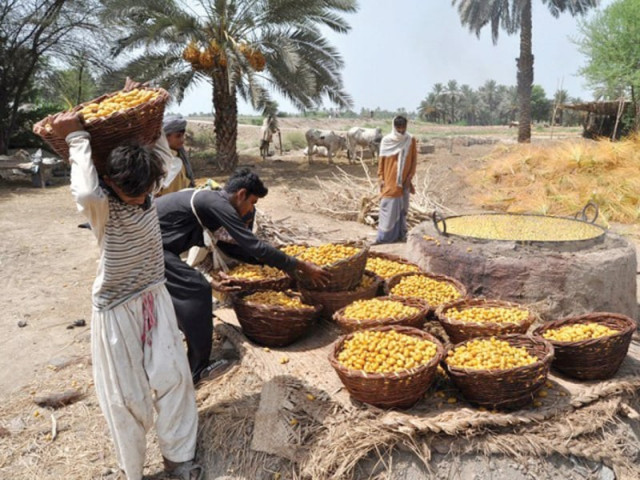Lack of exports: Pakistan’s inability to date
Sector needs development, potential exists to earn foreign exchange.

With roughly 535,000 tons of dates produced every year, industry sources say the country falls among top five producers of this commodity – down from top three producers a few years ago. Instead of importing dates, Islamabad should be exporting this fruit, they say.
Of the total produce, Pakistan exports only 15% or 81,000 tons – according to estimates of fiscal year 2012-2013 – while local consumption is not even 5% of the output.
By contrast, the country imports dates to meet local demand almost every year in the month of Ramazan, a peak month for the consumption of this fruit. Imported dates are processed in comparison with the local ones thus are more appealing to the consumers, traders say. This is another reason for importing dates.
If the sector would develop proper infrastructure and adopt modern agricultural techniques, it would not only feed locals but also boost the country’s foreign exchange reserves by increasing exports.
The harvesting season for dates starts in July and runs till September – the local fresh dates, therefore, hit the markets after mid-Ramazan. But due to the lack of value addition, processing and preservation, the local farmers are unable to stock dates for a longer period and even lose as much as half of their produce every year.
“Value addition, such as proper storage infrastructure and modern preservation techniques can help us avoid wastage and even increase our exports,” Harvest Tradings’ Director Ahmed Jawad said. “In fact, Ramazan is not the only opportunity, international markets, such as EU are big buyers of dates and import the fruit regularly,” he said.
There are about 1.7 billion Muslims, Jawad says, but the country doesn’t even tap 2% of that market. “We can increase our exports up to $300 million from the current $28 million through value addition.”
A host of multiple value-added products are prepared from the fruit of date palm, which include date paste, date pressed blocks, date syrup, date liquid sugar, date jam, date vinegar, cosmetics and non-alcoholic sparkling drinks, according to Jawad. “Even date seeds that one throws away as waste are quite useful. In Morocco, coffee is being prepared from date seeds,” he said.
However, the yields in Pakistan have not increased for more than a decade while the rest of the world has more than doubled its production, according to Jawad. Moreover, he says, Pakistan receives low prices of its dates as compared to other export countries like Israel, UAE, Egypt and Tunisia because of low standard and lack of value addition.
Giving an example, he said Balochistan has the largest share in dates production but there is no infrastructure there. “Iranian buyers come to Pakistan and buy our dates. After value addition, they brand and sell these dates to other countries on higher prices, and even export to us.”
Due to lack of facilities, many farmers dry their dates and export a bulk of them to India – one of the major buyers of Pakistani dates with imports worth Rs.4 billion, according to industry estimates.
Besides proper storage and value addition, date farmers also lack techniques to control fruit disease thus a significant amount of their produce perish in the post harvesting process.
“About 25% of our produce is wasted mainly due to diseases caused by different pests,” said Sarfaraz Ahmed, a landlord who grows trades dates in Thari city, District Khairpur – a major production hub for local dates.
Ahmed, who also has a wholesale business of dates, sells his dates across Pakistan and exports them through traders to major markets of North America, Europe and the UAE. If the government can provide proper infrastructure, he said the cost of business could go down.
“We stock our dates in a private cold storage in Sukkur that costs us Rs1,200 per 35 kilogrammes,” Ahmed said. This cost is very high for some farmers who store their dates in facilities as far as Lahore, he said.
Jawad, the exporter, says the government should encourage business community to invest in this sector under public-private partnership as building the value chain requires huge capital expenditures.
Published in The Express Tribune, June 30th, 2014.
Like Business on Facebook, follow @TribuneBiz on Twitter to stay informed and join in the conversation.



















COMMENTS
Comments are moderated and generally will be posted if they are on-topic and not abusive.
For more information, please see our Comments FAQ